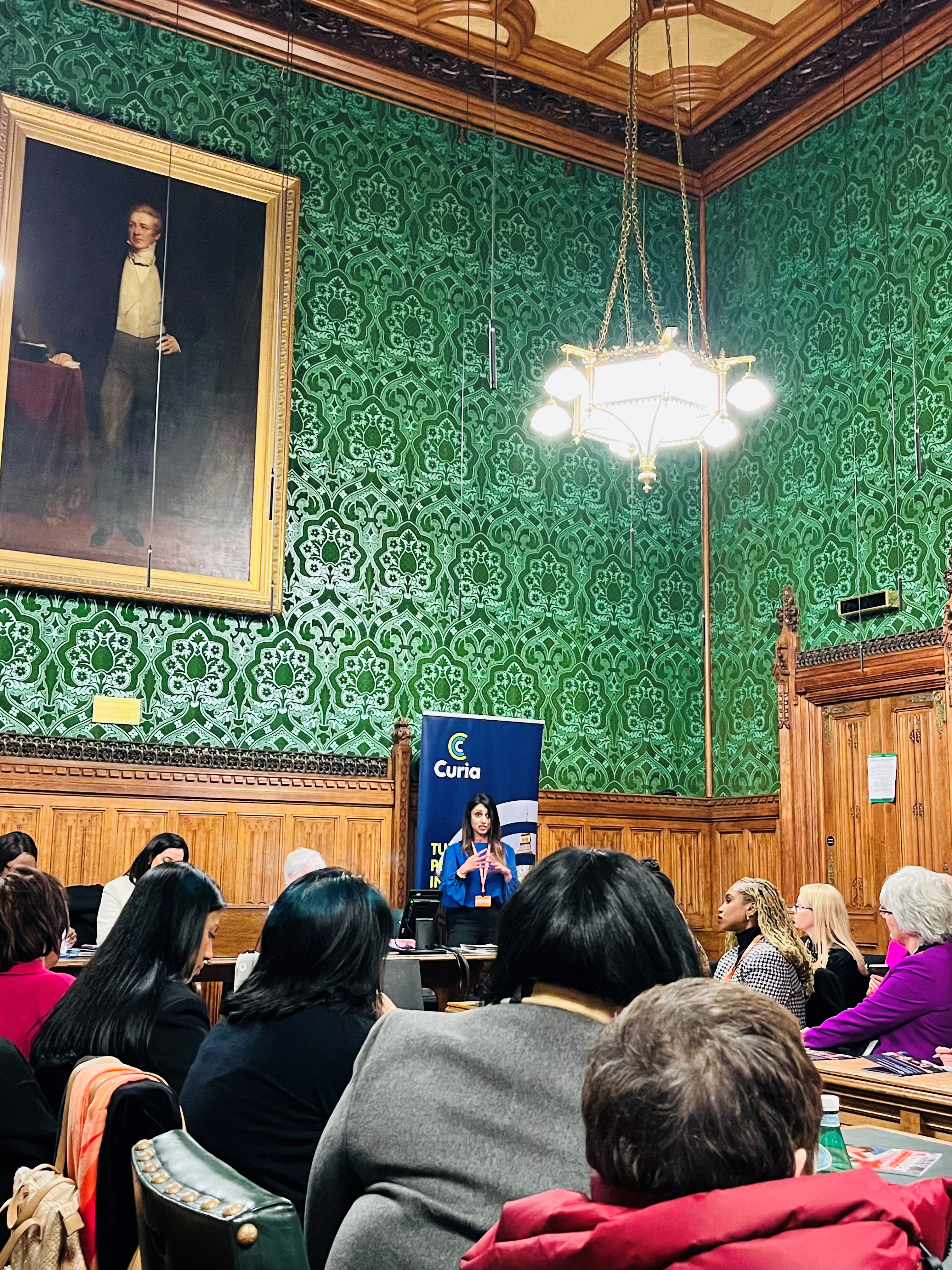The state of women’s health in the UK: A parliamentary roundtable

On 11th February, pharmaphorum was invited by Curia to attend a parliamentary roundtable focussed on women’s health, held at the House of Commons and hosted in collaboration with Members of Parliament and leading healthcare experts.
The UK faces one of the largest gender health gaps among G20 nations and women’s health challenges remain significantly – and unacceptably – underserved. The roundtable therefore sought to tackle the issue head-on, aligning with the objectives of the Women’s Health Strategy for England.
Fatima Kamara, senior management executive at NHS England, chaired the discussion, together with Professor Ann Keen, Chair of Curia’s Health, Care, and Life Sciences Research Group, and Kirith Entwistle, Labour Member of Parliament for Bolton North East – who stood in for Paula Sherriff, inequalities programme lead at NHS Wakefield and former Shadow Minister for Women and Equalities and Mental Health, who was unable to attend – as well as Professor Dame Lesley Regan, women’s health ambassador and Professor of Obstetrics and Gynaecology at Imperial College London.
A wide variety of attendees were in the room – the majority of them women – including pharma companies Sanofi and Bayer, whose Shobhna Ladva, head of women’s health at Bayer UKNI, was a speaker during the evening. Also in attendance were government and NHS representatives, as well as many others.
Women’s health in the UK today
Pressing health challenges are faced by women across the UK, stated Kamara, while Prof Keen put it simply: “Women’s health is all about inequalities.” Indeed Entwistle herself, who has been working closely with the Women’s Equality Committee, noted that the current culture in health centres is actually detrimental to women.
The overall ethos of the evening, then? That women will not just ‘get on with it’ anymore. A paracetamol is not a panacea. We must henceforth be taken seriously – a sentiment echoed throughout the evening. And it starts with a voice that is heard.
Central to the roundtable conversation was the government’s upcoming 10-Year Plan and the need for priority appointments, how long waiting times in A&E have only increased, and that many GP appointments are dismissive in tone. Just one example shared as a case in point was an endometriosis sufferer’s eight year journey to diagnosis, on average. Bear in mind that endometriosis affects 1 in 10 women; it is a common condition.
For Prof Dame Regan, much of women’s healthcare is what she terms ‘maintenance’ health. In short, women as a general rule have 12 periods a year for some 40 years. Oftentimes, those periods can be physically debilitating and affect mental health – impacting a woman’s contribution to society. To address this issue in the first instance, she suggested the role of women’s health hubs or women’s health champions: care accessible virtually, for when a woman needs to ask for help.
Women’s health is, evidently, not just gynaecological. From heart disease to cancer, to osteoporosis and frailty, to dementia – women’s health inequalities stretch into the realm of clinical trials challenges, also. After all, as a biological body, women are far more complex than men. And yet, medicines are largely developed based on trials of white males. Small men we are not; white, certainly not necessarily so. Logic dictates the situation must change.
There is amongst all this the need to correct the myth-sayers: women might live longer than men, but they survive a disproportionately longer time in ill health than their male counterparts; later female health is not the majority of the market, rather it is the 20-50 year old bracket that is most concentrated for female-specific disorders; and making up 51% of the population, how can pharma yet state – as has been much referenced – that women’s health is a ‘niche market’?
A three-pillared approach was presented by Prof Dame Regan: that, instead of focusing on the hospital setting, there should be more discussion of the possibilities of the community; that from analogue processes there should be a more determined shift to digital; and that, instead of disease, minds should be set to consideration of the potential of prevention when it comes to care.
“We have made a noise,” Prof Dame Regan said, but warned that the problem should stop being admired. Now, there should be a turning to action with impact.

Perspective: Pharma, patients, and NHS
Bayer’s Ladva asked those in attendance to spare a thought to the families of women. According to the NHS Confederation, there are £11 billion lost due to hours of work missed due to female ill health. She also brought up Bayer’s launch of Fight the Flow campaign for menstrual health, before stating her case: that fragmentation needs to stop. A woman’s health journey must be seamless.
Second speaker of the evening was Tanya Simon Hall, founder and CEO of the Adeno Gang, who provided a personal lived experience with endometriosis and adenomyosis. Such lived experience – the patient experience – she insisted should be embedded in healthcare policy. As a patient advocate, a living example of this drive to no longer suffer in silence, she asked, “How is it possible there are still girls who don’t know their own biology?”
Additionally, the economic issue of misdiagnosis or non-diagnosis of women’s health issues was again put in the spotlight: “No woman should have to choose between her career and her health,” she concluded.
Third speaker of the evening was James Benson, chief executive of Central London Community Healthcare Trust (CLCH) and health lead for Westminster and the Royal Borough, as well as national advisor for virtual wards at NHS England. Of his workforce, 82% are women and of those 11% are over 60 years of age – ultimately, a female-led organisation. Benson shared that 93% of their patients are seen at or below 18 weeks in their health journey – which, he said, is still far too long.
A case study in best practice
Essential Parent’s work with NHS Cheshire and Merseyside ICB was highlighted as an example that hit all three proposed pillars of Community, Digital, and Prevention.
Diana Hill, co-founder of Essential Parent, and Cathreine McClennan, director of Cheshire and Merseyside Women’s Health and Maternity Partnership, at the Cheshire and Merseyside ICB, spoke about the Cheshire Merseyside Women’s Health and Maternity (WHaM) App. The keywords in its successful deployment, they said, were understanding, listening, action, education, and equity of access.
Developed to improve access to timely, accurate, high-quality, evidence-based information specific to women’s health, the app adopts a ‘life course’ approach, providing information on a variety of women’s health issues, including conception and fertility, menstrual health and gynaecological conditions, menopause, gynaecological cancers, and pelvic floor health and maternity. It is ORCHA and Cyber Essentials approved and permitted to use NHS login.
With a regional content hub containing 1,000 evidenced-based, expert-led written articles on these issues – selected from Essential Parent’s central content hub of over 2,000 articles – the app can translate the content into 75 languages. These articles follow advice from over 40 national medical and mental health organisations, such as Action on Smoking and Health (ASH), Child Accident Prevention Trust, Endometriosis UK, MIND, NSPCC, St John’s Ambulance, as well as UNICEF UK Baby Friendly Initiative and Wellbeing of Women.
There was a briefly impassioned debate about the effectiveness of apps in the healthcare setting during the roundtable discussion, in terms of patient beneficial information, one attendee calling apps insufficient: “Otherwise, leaflets would have cured matters,” she claimed. It was agreed that apps are beneficial as an addition, but not as ‘an instead of’ option.
Unbiased data, environment, education, and prevention
Entwhistle kicking off the official roundtable, Rosalind Way, director of national NHS engagement at IQVIA, noted that data sharing permits a means by which to do away with traditional fragmenting, and affect matters nationally: “Digital can’t be local,” she insisted. Also cautioned within the room was that AI can be employed to alleviate system burden, but that the models should be developed by women to offset biased training of the models.
Other comments included the lack of investment in maternity services, despite over 700,000 births per year. Indeed, one example told of having gone to the GP with a breastfeeding problem and all she was told to do was “look at the QR code” for help. Meanwhile, Clare Roberts-Molloy, founder and CEO of charity Periods Matter, called for the fundamental right of access to period products for all within the UK.
Maria Adebowale-Schwarte, director of the Living Space Project and an ambassador for the Women’s Environmental Network called for education at all levels – from patients to physicians to politicians – and that that comes from data. Also highlighted by Adebowale-Schwarte was the role of environmental pollution in worsening health, including air pollution and the ill effects of plastics. She emphasised that, “the people are dying before the planet is dying.”
What became clear as the evening progressed was a distinct lack of representation in the room of younger women, on the whole. But the educative vein continued to flow strongly, a veritable artery. Additionally, it was considered how prevention could very well begin in the school setting – the risk of misinformation rounding out the discussions, touching upon the very real fight against TikTok and Instagram influencers in this regard. There was brief discussion of the role of data in life sciences, starting studies somehow pre-symptoms, also.
While Entwhistle closed with encouragement to all in attendance to write in with their suggestions and contact their local MPs, it is worth noting that Benson had earlier advised, “Never underestimate the power of a woman.” These conversations are not new. The time for real action, as Prof Dame Regan urged, is now. Whether man or woman - let’s change the narrative for women’s health from today. The power is all of ours.












